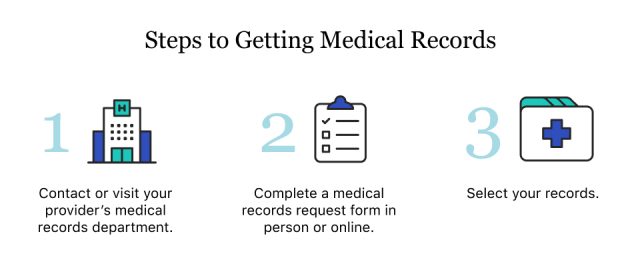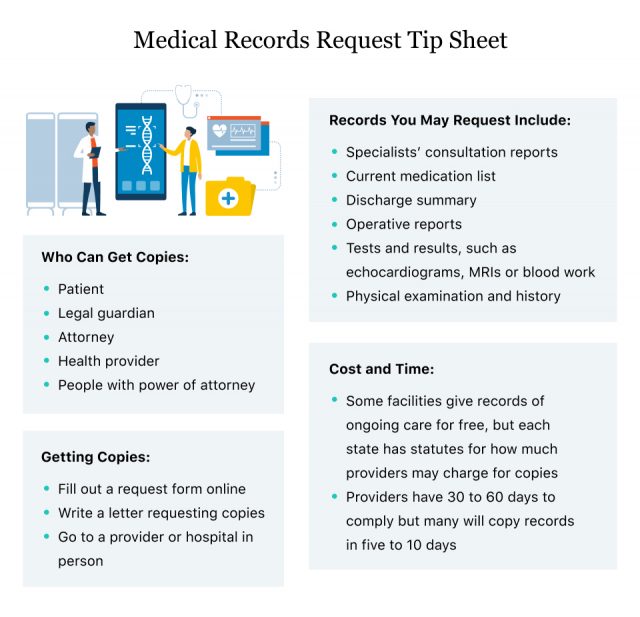Requesting a List of People Who Have Reviewed My Medical Records
How to Obtain Medical Records
The Health Insurance Portability and Accountability Act (HIPAA) gives patients the right to view their medical records, get copies and brand corrections to them. This stride-by-stride guide explains how to obtain medical records, how much they cost and what to practice if your asking is denied.

By law, patients and their representatives have access to medical records including billing information, medical examination results, dr.'s notes, lab reports and more.
Plaintiff's lawyer Holly Ennis helps her clients understand the medical records procedure and obtains records on their behalf. There are many reasons why someone may desire their records, she said.
"The most mutual are: the patients are moving to a different area and desire continuity of care with their records, they are changing physicians, they are involved in litigation or the health care providers may be retiring or closing the practise," Ennis said.
Keeping copies of your medical records can also help y'all spot errors that salve money and even your life, according to U.S. News and Earth Report.
Benefits to Keeping Medical Record Copies
- Allows you to make sure your records are complete and correct
- Your doctors may not always share information, having copies to show your doctors volition help yous go better intendance
- Allows you to enquire about preventative care and treatment
- Helps prevent getting tests you lot don't demand
- Gives yous a current listing of medications and immunizations
- Helps keep your allergy data upwardly-to-date
- Allows you to bank check records to make sure your diagnosis and reason for a doc's visit matches your billing statement and billing codes
- Allows you to dispute charges for in-hospital care like surgery fourth dimension, drugs yous didn't take or procedures you lot didn't have
- Gives you data you need to negotiate bills with your insurance provider

Who Can Request Records
Co-ordinate to HIPAA, patients have the right to request their records. Other individuals tin also request records on behalf of a patient. These include a parent, legal guardian, patient advocate or caregiver with written permission from the patient.
Some providers may have special forms for patients to complete to give permission for representatives to obtain medical records on their behalf.
"An attorney would still need a signed medical authorisation release to obtain a client'southward medical records from any healthcare provider," Ennis said. "Often, many healthcare providers respond more apace to an attorney than to a patient."

Requesting Your Records
Most hospitals and providers in each state take a similar process for requesting records. It typically begins with a written or in-person request.

EXPAND
"Normally, 1 would merely have to phone call the health intendance provider and asking a copy of the record and choice them up, afterwards signing a release for the records," Ennis said. "If they want them mailed or are gathering them from a infirmary, they will exist required to sign a medical authorization release class commencement."
Requesting medical records in person allows a patient to make sure they get the exact records they want, Ennis added.
"Yous are much more than likely to go a more consummate and quicker response this way," she said.
"Ordinarily, i would simply accept to call the health intendance provider and request a copy of the tape and choice them up, subsequently signing a release for the records."
Some records that patients may want to request are test results, reports for surgeries, physician's notes, belch summaries and specialists' reports.
If y'all've had surgeries that require implants such as articulatio genus replacement surgery or hernia surgery, the surgical notes should take information near the model and brand of the implant. This is important information for recalls or if you lot need to file a lawsuit for a faulty product.
Each state has laws for how long they must keep records. Most states volition go on records anywhere from v to 10 years. For a complete list, visit HealthIT.gov.
If you are in person, bring an ID. If sending to some other person or party, you will need to sign an authorization class and personal representatives need powers of chaser.
Electronic copies may be available as DVDs, CDs, USB flash drives or secure emails, and patients may request i of these formats.
Records Your Provider May Deny
HIPAA allows a patient to get almost all records with a few exceptions. These exceptions typically include a provider's psychotherapy notes with impressions rather than diagnoses. In full general, if whatever information may pb to patient damage, a provider may deny the request.
Examples of Records Providers May Deny
- Psychotherapy notes and other mental health notes that may lead to patient harm
- ER records that are specific to hospital or company procedure and not patient care
- Data involved in a lawsuit
- Records that include information about other people or a third party that may be harmed by the release of information
- Ongoing research that has not been completed
- Whatsoever records that may endanger patient condom
How Long Does Information technology Accept?
Providers have anywhere from 30 to 60 days to procedure a request. Simply many facilities may provide records within five to x days, according to American Health Information Direction Association.
"I called the records section and they sent me forms to fill out via email or online," said patient Rachel Brummert, who has had to request medical records on multiple occasions. "On average it took about two weeks for my records to be copied."
Always keep records of your requests in instance you need to follow up with the provider.
"On average it took about 2 weeks for my records to be copied."
How Much Does It Cost?
Under HIPAA police, a provider may not charge you for the labor of searching or retrieving records. They also cannot deny you a copy of your records if yous have not paid for services rendered. But they tin charge you lot a reasonable fee for the copies.
"There are statutes in every country concerning how long healthcare providers must retain medical records and what they are allowed to charge for copying said records," Ennis said.
Costs for Copies
The cost for medical records ranges from $0.25 to $ii.00 per folio in most states. Check your state's fees on the Records Company website.
In most states, the toll ranges from $0.25 to $ii.00 per folio.
The rate typically gets cheaper as the page count goes upwards. For example, Louisiana charges $ane.00 a page for the outset 25 pages, $0.50 for pages 26 to 350 and $0.25 for pages above 351.
"It does go pricey though," Brummert warned. "I was charged $1 per page, and my records are pretty thick."
The Records Company has a list of records fees by state, said Ennis. Patients should inquire about the price and get an estimate earlier ordering records to avert a large bill for copies.
Records from a Provider No Longer in Practice
Sometimes, patients may demand records from a physician no longer in practise. Under constabulary, the doctor must transfer his or her records to another provider.
If the doctor left a practice that is still operating, the records volition remain with the practise. If some other doctor bought the practice, the new practice would maintain the records.
If the provider didn't go out whatever details before leaving exercise, a patient may exist able to put together records from hospitals, labs and specialists they saw. The insurance company may also exist able to assistance.

Aggrandize

Electronic Records and Patient Portals
Electronic Health Records (EHR) are some other way patients may have admission to information. Patients should ask their provider if they have a patient portal bachelor and information on how to access it.
Portals allow patients to access their health data anywhere with an internet connection at their convenience, according to HealthIT.gov. Records available through patient portals include: recent medico visits, lab results, medication lists, allergies, immunizations and belch summaries.
Patients may also have portals to view examination results directly from the lab. For example, LabCorp'due south patient portal allows patients to view and print contempo lab results.

Requesting Some other Person's Records
Requesting another person's medical records has its own requirements. There are unlike forms to fill out and the requestor must have the proper legal documents to evidence the medical records department.
If a patient is no longer able to make decisions or is incapacitated, their representatives must accept a power of attorney for healthcare and finances — a special document that allows a specified person access to medical records.
Requesting medical records of a deceased patient requires someone to be an executor of the deceased patient's estate or to get permission from the executor. If no executor exists, someone can petition to become the executor through probate courtroom. The petitioner must have documentation of their relationship to the deceased.

How to Correct Errors or Omissions
"I've had to asking my medical records several times," Brummert said. "Sometimes to check for and correct inaccuracies — you'd exist shocked how many at that place could be in your file."
An example of an error might be that a hip patient complained of pain in swelling after the surgery, but the medical tape reports no hurting or swelling. Other errors might be in the medication list or allergies to medications a patient has.
Most of the fourth dimension, patients tin simply call the provider to get these errors fixed. They should do so every bit shortly as possible.

What to Practise If Your Asking Is Denied
If a provider denies a medical records request, patients should make certain they provided all the information necessary on the class and that all proper authorizations have been signed.
If the patient wrote a personal letter requesting records, make sure the post-obit patient information was in the original asking:
- Date of birth
- Name
- Social Security number
- Contact data (address and telephone number)
- Email address
- Dates of service and specific records requested (tests, discharge notes, etc.)
- Method of delivery (email, in person, through mail)
Sometimes, just calling the provider'southward medical records department can resolve whatsoever problems.
"Patients are absolutely entitled to obtain their medical records as indicated past 45 CFR, section 164.524. Usually, the provider has thirty days to respond," Ennis said. "Patients need to look upwardly the country law in their states so they are set up to demand their records under legal authority if the health care provider is not-compliant."
George Washington Academy publishes the laws in each land on its website.
Patients may also file a complaint with the Office for Ceremonious Rights (OCR) if they experience a provider violated their rights. Patients have to file a complaint within 180 days of the violation.
manifoldscerfumfor57.blogspot.com
Source: https://www.drugwatch.com/health/how-to-obtain-medical-records/
0 Response to "Requesting a List of People Who Have Reviewed My Medical Records"
Post a Comment